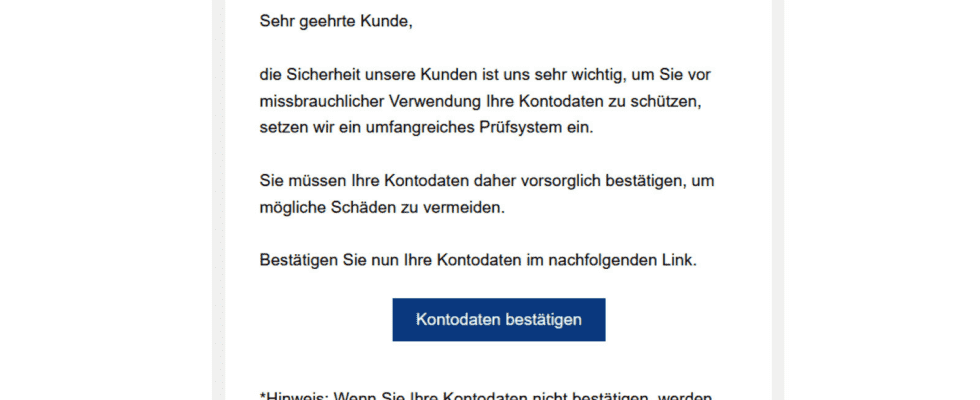In a phishing email, cybercriminals claim to want to protect your account on behalf of Deutsche Bank. However, the opposite is the case.
This is what the phishing email looks like in the name of Deutsche Bank. (Source: https://www. Verbraucherzentrale.de/wissen/digitale-welt/phishingradar/phishingradar-aktuelle-warningen-6059)
- Cyber criminals send phishing emails on behalf of Deutsche Bank.
- You are supposed to confirm your data via a link and thus deliver it to the criminals.
- Leave the email unanswered and delete it.
With the subject line “credit card temporarily blocked”, phishing emails claiming to come from Deutsche Bank are currently attracting attention.
According to the consumer advice center, the e-mail states that you have to go through a verification system to protect your account data from misuse and to avoid damage. If you click on the attached link to confirm your data, however, you will achieve the opposite.
Receive the latest fraud alerts as a message?
Fake invoices by e-mail, profit notifications via SMS or WhatsApp Trojans. On this overview page we collect current security warnings on the topics of phishing, spam mail fraud and subscription traps.
Because it takes you to a fake Deutsche Bank website and you give your bank details directly to the cybercriminals. Do not let yourself be put under pressure by supposed blocks and contact your bank by phone if you have any doubts.
If you have given your data anyway, you can avoid worse things by getting in touch with your contact person or the Deutsche Bank hotline on 069 910 10000 as soon as possible.
Simple signs: This is how you recognize every phishing email
A first indication that you have received a phishing email: the email will ask you to confirm personal data or to enter it on a website. This Under no circumstances should you comply with the request. In addition, criminals often use the official logos of the companies they are copying in their emails, but not official sender addresses.
If you find the sender suspicious, you should read the email twice. You will often find spelling mistakes or inconsistencies in German grammar. The attackers usually do not write their emails themselves, but instead use automatically generated messages or translate known emails with a translation program. But why all the effort?
What do criminals achieve with phishing attacks?
Phishing is used on the Internet to collect real user data. Money can be made with these if e-mail addresses, names and other information are sold for advertising purposes or passed on in criminal forums. With the data obtained, cyber criminals can also address future phishing attacks in a more targeted manner, making their attacks more effective.
Did you receive a suspicious email?
Forward them to [email protected]
or follow us on:
Phishing Checklist
- ✔
Spelling mistake? - ✔
Sensitive data requested? - ✔
Official logos? - ✔
Unknown sender?
Attachments and links contained in malicious e-mails also often inject malware or viruses onto your computer. In addition, you should not simply ignore suspicious emails. Forward them to the above email address and help us report future phishing attacks.
More fraud alerts on netzwelt – stay one step ahead of cybercriminals
But phishing emails are not the only danger lurking on the internet. In addition to fraud attempts, there are all kinds of viruses, Trojans and malware that can infect your computer. Unfortunately, data scandals are also part of everyday digital life. You can see the five most recent articles on the subject of “Scam Alerts” below:
Do you want to stay informed about the latest fraud reports, Subscribe to netzwelt on Twitter, Facebook and Instagram. You can also find all articles on the subject on the next page.
” Tip: The best VPN providers for more security and privacy
Don’t miss anything with the NETWORK-Newsletter
Every Friday: The most informative and entertaining summary from the world of technology!
